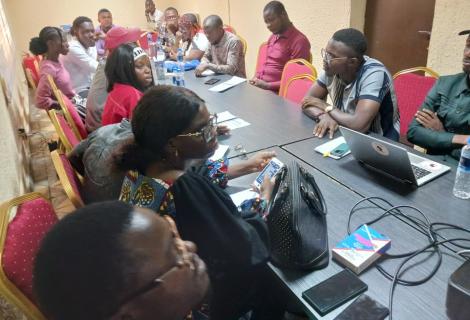ActionAid Liberia Straightens Liberian Youths’ Skills in Elections, Democracy, and Governance Issues

Benefiting 25 Youths From Across 6 Youth-Led Organization
ActionAid Liberia has trained 25 young Liberians from across the Federation of Activista Network, Federation of Liberian Youth, Mano River Union Youth Parliament--Liberian Chapter, Radical Young Women Movement, Election Network Liberia, Liberian Students Union in elections governance and democracy.
The three days Digital Training Package (DTP) workshop supported by Democracy Reporting International was focused on democratic values, and participation, with emphasis on introduction the participants to election observation, providing youth with the fundamental knowledge on democracy, promoting youth participation, and the ethical principles and for them to play actives roles in Liberia’s electioneering process comes 2029.
In 2029, Liberians will go to election to elect a new president, and members of the House of Representative and the House of Senate.
The training was based on modules developed by our partners from Democracy Reporting International and it equipped the twenty-five young leaders with practical tools to track, monitor, and report on electoral processes, preparing them on ways they can go about advocating for greater accountability, and transparency, creating civic awareness across various communities and within their youth network and mostly importantly helping youth to adequately understand Liberia’s electoral cycle and the important roles they play.
The Digital Training Package (DTP) objectives further educated the participants identify the core democratic values of a citizen electoral observation mission, recognize citizens responsibilities as a human rights defense activity, and discern the importance of advocating for adequate framework for the electoral conducts.
With ActionAid in partnership with Democracy Reporting International (DRI), the youth program’s coordinator, Norwu Harris at the start of the training told participants that ActionAid and DRI are on a mission with an overall goal of channeling a new course toward strengthening the effective political participation of Liberian youth.
To achieve this, she said both institutions are ensuring that youths are well-positioned, have the rights skills, and become empowered ahead of Liberia’s 2029 presidential and general elections, where “youths do not to only see themselves to be used as chanters of slogan, and songs for politicians, but instead see themselves a critical part of Liberia’s elections and democratic processes from specialized training modules.
“During these three days, we have been using a specific tool that was developed by our partners and so many other partners and funded by the European Union.”
She added by saying “Some of you will say, but election is way in 2029, so Why is ActionAid engaging young people? It’s because we are hoping that by 2029 so that young people can actually be equipped with all the necessary capacity and tools to lead drive the electoral processes in Liberia.”
ActionAid Liberia is working towards building a stronger generation of Liberian youthful population who can responsibility engage in electioneering processes and also help to create public awareness for and creating civic education to members of the public to understand their civic responsibilities to the state during and after elections.
After the training participates are now equipped to go back to their various networks to roll out TOT and pass on the skills they acquired to other youths, educating their peers about democratic participation, civil leadership and responsibilities, governance processes using specific the tool developed by ActionAid partner.
As part of the post-training activities ActionAid Liberia will put these digital tool kits on its platforms where youth can access and use them as resource materials all geared at contributing to Liberia as a country conducting credible and impactful elections, but with youths actively participating in more substantial productive ways.
Norwu then concluded by reminding participants that while young people often demand accountability from state authorities, by the knowledge and skill they have acquired, they too can begin holding themselves accountable for the right actions.